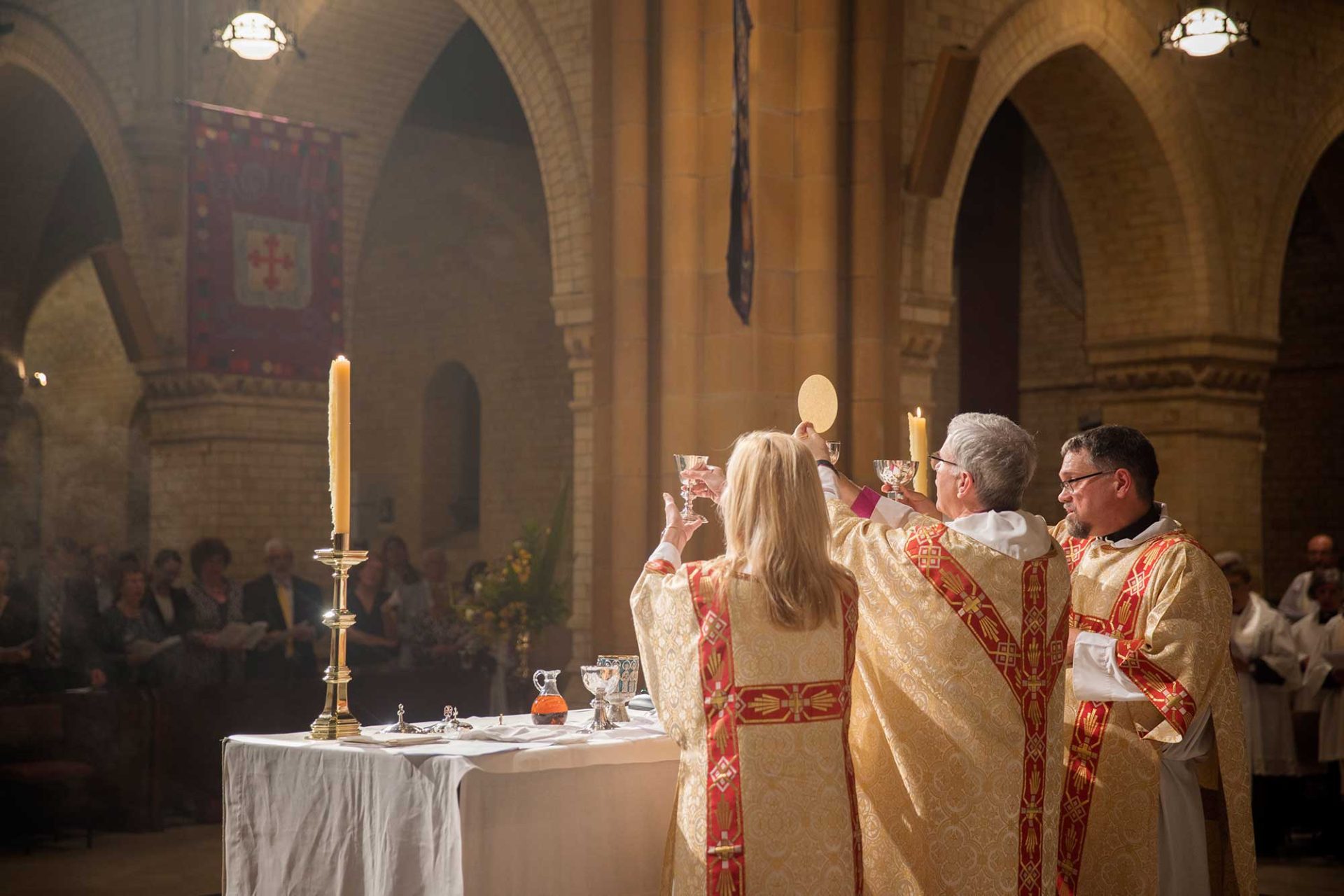Exploring Ordained Ministry
Ordained ministry is one of the most challenging yet rewarding vocations in modern society.
We welcome inquiries from those exploring a calling to missional leadership in the Anglican Church in particular context to Newcastle Anglican.
Our desire is to select appropriate candidates and prepare them for dynamic ministry in a changing world.
There are many opportunities for ordained ministry including parish work and chaplaincy.
Every year we work with people who explore giving themselves to full-time paid stipendiary ministry and those who explore self-supporting ministry.
The experience of God’s call is wonderful. You may have been encouraged by your parish to explore this direction or the stirring of your heart and mind has led you this way.

Below is the outline of the Diocese’s stages of discernment, education and formation that have been approved by the Bishop of Newcastle.
Enquiry
You should make your initial expressions of interest to Bishop Sonia Roulston. She will explore your interest with you over the phone and then may interview you. She will also seek the views of those who know you and your ministry.
Bishop Sonia will help you explore your readiness for a vocation to ordained ministry. She may also arrange an interview with our Diocesan Bishop who may invite you to enter the Diocesan Year of Discernment.
The Year of Discernment
During the Year of Discernment enquirers meet with Bishop Sonia to reflect on the nature of ordained ministry.
Over the year you will participate in several interviews and be expected to be active in ministry in your local parish or ministry setting. At the end of the Year of Discernment, enquirers may be invited to a Discernment Day where you will explore your calling to ordained ministry with several people appointed by our Diocesan Bishop.
Theological Education
During this time people may also begin their theological education. Our theological education provider is Trinity Theological College in conjunction with the University of Divinity, Melbourne. You can find information about the degree program on their website.
Candidates in self-supporting ministry may also complete degrees in this way or may be encouraged to consider the Certificate or Diploma in Theology through the Adelaide College of Divinity.
Postulancy
Should the Bishop agree to accept a person as a candidate for ordination, they will enter into a period of postulancy and later a period of intensive formation. Information about this ongoing process is available from the Director of Vocations.

Intensive Formation
The Bishop will normally invite a person to enter the Intensive Formation program when they are able to complete their academic study requirements on a part-time basis over two calendar years.
In addition to completing their academic studies, candidates in formation must:
Attend the Ministry Formation which involves
- A 2 week-long ministry intensive which normally runs over 5 days and is conducted face-to-face;
- Formation days which are normally held on a Saturday
Undertake a ministry placement approved by the Bishop completing a program of activity and experience negotiated with the candidate, the Director of Formation and the Placement Supervisor. The placement program must be approved by the Bishop (or the Assistant Bishop overseeing Formation).
The placement for candidates of stipendiary ministry: Involves intensive exposure to different aspects of ministry for an average of 20 hours per week across 10 months of each year
The placement for candidates of self-supporting ministry: Involves sustained exposure to different aspects of ministry over the course of the two years recognising that people in self-supporting ministry will normally continue their ministry under the supervision of another member of the clergy.
Undertake other spiritual formation and discernment with the support of their Spiritual Director/Spiritual Friend and in response to specific learning outcomes identified by the Bishop or Director of Formation.
The assessment of people in formation is against their readiness to undertake the ministry for which they are being trained. Confidential reports are prepared for the Bishop by the Director of Formation, an Examining Chaplain, and the Placement Supervisor.
Exploring the Ministry of Lay Reader
One significant ministry that has existed since Anglicans came to the region is the ministry of Lay Reader.
Lay Readers exercise what is sometimes called “a teaching and preaching ministry within a pastoral context”. They are authorised to conduct or assist in conducting worship, and to assist in the pastoral, evangelistic and liturgical work of the Church, in the parish, or area where they are licensed. Many Lay Readers are also authorised to preach.
Readers are lay men and women, from a wide diversity of occupations and backgrounds, who recognize a call to serve God and his world through the Anglican Church of Australia.
Lay Readers express their vocation as lay people helping to connect the worship and ministerial life of the church alongside their everyday life and work.
Discerning A Call To Be A Lay Reader
The call to become a Reader may be felt by an individual or may come from outside; from their incumbent, a fellow worshipper, or from someone who does not even attend church but recognises certain qualities. There is no single profile for a Reader; they can be men or women, almost any age and come from all walks of life.
If you think God is calling you to Reader ministry you should consider questions such as:
- Is God calling you to serve Him more fully in ministry?
- Do you have a sense of call as a lay person to help shape the spiritual and pastoral life of your parish?
- Do people affirm you as having the gifts for leading and encouraging people in a Godly way?
- What is the pattern of your present discipleship?
- Have you talked over the possibility of Reader ministry with your partner and family? Are they ready to support you?
- Is your Incumbent willing to ask the Parish Council to agree to your nomination as a candidate?
All candidates for Reader Ministry will need the support of their local parish church. They must be, or become confirmed and regular communicant members of the Anglican Church, and will be asked to complete the Safe Ministry requirements of the Diocese.
The Selection Process
Your incumbent will nominate you to the Bishop for this ministry. You may be asked to meet with one of the Assistant Bishops or Archdeacons for an interview.
You may be licensed for a general ministry for being a lay reader. However, before you can be licensed to a preaching ministry you must have completed an approved course of study.
We seek to understand your current capabilities and your capacity for further development across your vocation, faith, and spirituality. We are looking to see that you are demonstrating spiritual leadership, an aptitude for training, and a mature, caring, and balanced personality which is well received by your peers.
You must also be willing to work collaboratively within the ethos Newcastle Anglican.
Candidates should be able to speak of their own sense of vocation to ministry and mission, referring both to personal conviction and to the extent to which others have confirmed it. Their sense of vocation should be faithful, realistic and informed.
Candidates should show evidence of commitment to a spiritual discipline which involves individual and corporate prayer and worship. Their spiritual practice should he such as to sustain and energise them in their daily lives.
Candidates should demonstrate self-awareness and self-acceptance as a basis for developing open and healthy personal and pastoral relationships as ministers.
Candidates should show the potential to offer wise leadership in the Church community and to some extent beyond it. They should also show ability and willingness to co-operate with other ministers and to work as team members as well as leaders. They must be able to accept the leadership of their incumbent and others set over them in the Lord.
Candidates should show an understanding of the Christian faith and a desire to deepen that understanding. They should demonstrate personal commitment to Christ and a capacity to communicate the Gospel.
Candidates should be sufficiently mature and stable to show that they can sustain the demanding role of a minister and to face change and pressure in a flexible and balanced way. They should be seen to be people of integrity.
Candidates should have completed a recognised course of study or be capable of undertaking satisfactorily completing the Australis certificate. They should bring an open and enquiring mind.

Your Next Steps
Talk to your incumbent and/or the assistant bishop or archdeacon for your region and fill out the ministry application form.


